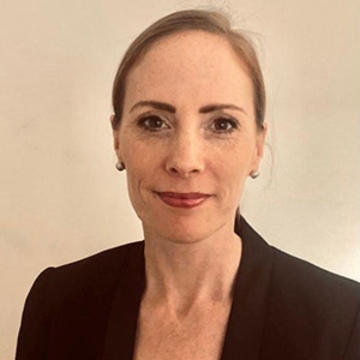Alexa Virdi, co-founder of Super Sapiens

Alexa Virdi is co-founder of Super Sapiens, a social enterprise creating fun and educational inclusive card games.
What is your background? What made you decide to become an entrepreneur?
I’m a lawyer, specialising in anti-money laundering, and then also human rights. I have a daughter, and when she was 2 years old we just really started noticing that there wasn’t very much diversity and representation in the books and the games that she had. So we made her a homemade version of the game, never thinking it would turn into anything, it was just a parent thing that we did. And then a bunch of my friends thought it was such a great idea, they said that “You should really try and create a product from this.”
What is your definition of entrepreneurship?
I’m not sure [it’s] entrepreneurship so much, but social entrepreneurship. I think sustainable, solution-focused business that cares about social benefit.

I made about 5 copies of the game for different friends. And it was literally only when I gave it to them that I knew. And their reaction, they said, “Oh this is something so amazing, you should definitely do something with it.” Because I was thinking this is such a nightmare, this crafting project has taken so long, I’m never doing anything like this again. As I went along, more and more people just said what a great idea they thought it was.
What would you say are the top 3 skills that needed to be a successful entrepreneur? Why?
I think drive, asking lots of questions, and then research. Do your research.
The drive part is important as it’s a lot of work. So you really have to be disciplined and driven and be passionate about what you’re doing. And there’s a lot of uncertainty at certain points. So I think the drive part can just help push you through difficult times.
In terms of asking lots of questions, I think particularly for us, because this isn’t an area that we’re experts in, or anything that we’ve done before, I had so many questions. And fantastically, because of the internet, there’s so many different online entrepreneur support groups that you could just ask questions, and save yourself literally days of research. […] From the feedback and comments you get from online, you can find out, what are the best ways to do it?
I’d start with research, and then once I have a vague understanding, I would then go and ask the same question to maybe 3 online entrepreneur groups, and send emails of the same question to people at for example the Oxford Centre for Innovation.
What is your favourite part of being an entrepreneur?
I think the thing I’ve really enjoyed is the creativity involved, and the collaboration. It’s exciting to learn about a new area, and meet lots of people who you wouldn’t normally meet, and like-minded people.
What individual, company or organization inspires you most? Why?
The Conscious Kid. They’re an amazing US non-profit that are leaders in education that promotes equity, inclusion, and promoting positive racial identity. It was started by PhD students that are also parents of colour. People who really saw that they wanted to make sure that their children had access to particular resources. They have also run incredible support programs during COVID and an anti-racism book project where lots of books are being donated to schools.
If you had 5 minutes with the above individual/ company/organization, what would you want to ask or discuss?
I’ve asked them lots of questions already, so to be honest, I actually wouldn’t have anything else left. But I think for me, it just reiterates the importance of going to experts in the field.
What would you say have been some of your mistakes, failures or lessons learned as an entrepreneur?
After we launched on Kickstarter, it was successful, but I realised I had absolutely no idea how Kickstarter works. I hadn’t done enough research on Kickstarter, on how the mechanics of Kickstarter work, and how to really, sort of, ramp up your campaign. Luckily, we met our target, but still, it was pretty hairy, and stressful.
I think that for every stage of development of the product, every iteration, we ran it by, at least 6 different people, whether it be friends, or parents, or officials at the Oxford Centre for Innovation. But even having done that, I really realised that it’s important to actually also then go to professionals for advice.
So for example, The Conscious Kid is the US non-profit that is the leader in education about equity and promoting positive racial identities. And even though we did so much investigation on who to include, in the approach to take, through lots of friends who were knowledgeable, and various other avenues, if we hadn’t actually then, just before we printed the first game, gone to The Conscious Kid for advice, we would have included lots of mistakes in terms of content. I think there’s a big difference in people who sort of know what they’re doing and are interested in the field to people who are really experts.
How have you funded your ideas?
We launched Super Sapiens on Kickstarter, so we probably raised about 75% of the funds from Kickstarter. And then the rest was from savings.
Are there any sector-specific awards/grants/competitions that have helped you?
We received about £1000 from Oxford Hub, which was amazing. We did also get some sponsorship from Deloitte – they bought a number of copies to donate to schools.
What is good about being an entrepreneur in Oxfordshire? Bad?
It’s the privilege of being at Oxford University that you have access to incredible resources like the Oxford Hub, the Oxford Centre for Innovation, the Foundry, where they do lots of free lectures on the tenets of entrepreneurship.
If a new entrepreneur or startup came to you looking for entrepreneurship resources, where would you send them?
The SaΪd Business School runs a lot of lectures that are open to businesses in Oxford. They run lectures on Map the System, which is wanting to make sure that organisations, especially social entrepreneurs, aren’t making things worse. For example, TOMS shoes originally said, “buy a pair of shoes, and we’ll donate a pair of shoes”. But actually, what that did is put a lot of businesses in the global South out of work, because people will get shoes donated. So they’ve now changed their model. So for me, part of our Map the System was making sure that we weren’t causing harm through the content and approach that we were taking.
I found this incredible resource, the micro-internship programme from The Careers Service, where Oxford businesses can apply to have Oxford University interns 3 times a year. And it’s literally been transformative, because I just don’t have time to do everything that needs to be done. So you have these amazing, bright, enthusiastic students who can do a lot of incredible work for you.
Have you faced any challenges as a woman entrepreneur? If so, how have you overcome them?
I don’t think I’ve found any specific hurdles from being a female. I think it’s actually my white privilege that overrides the gender issues, particularly in Oxford, because I have so much access to resources in Oxford.I think the climate has changed, I think it’s probably different in different industries. But in social entrepreneurship, and educational resources, I think it’s maybe not the same as some of the other industries, which are maybe more male-dominated.
What resources would you recommend for other women?
There’s a group on Facebook called Doing it for the Kids. […] It’s a group of entrepreneurs, and independent contractors, and self-employed people in all spheres. […] Because there’s about 6000 members, you get so many answers in terms of people who are experts who can just give you some guidance and point you in the right direction.
There’s also this group on Facebook called LIGHTBULB Entrepreneur and Press Hangout with Charlotte Fall. You pay £5 a month, if you’re accepted, and entrepreneurs, and self-employed people have access to all the national journalists. There’s no way that we would ever get the coverage that we did, if it wasn’t for that group that really helps act as levelling out the playing field for small businesses.
How could institutions such as the University of Oxford better support women entrepreneurs?
Things like childcare. I was really lucky, I went to a bunch of entrepreneurial lectures, and I just brought my daughter in her pushchair with an iPad, and had headphones, and everyone was really receptive. So I think if they had not let her come, then I would say getting more support around child care.
But I think that it is really important to have resources specifically earmarked for Black, Indigenous, and POC students. But also for a lot of the Oxford entrepreneurial places to specifically have some support for non-Oxford University students, for Oxford residents.
Do you have any advice specifically for other women who want to be entrepreneurs?
For every iteration of product development have about 5 friends [and] experts to run things by. Ask questions to as many people as possible at every stage!
Share this
More news



